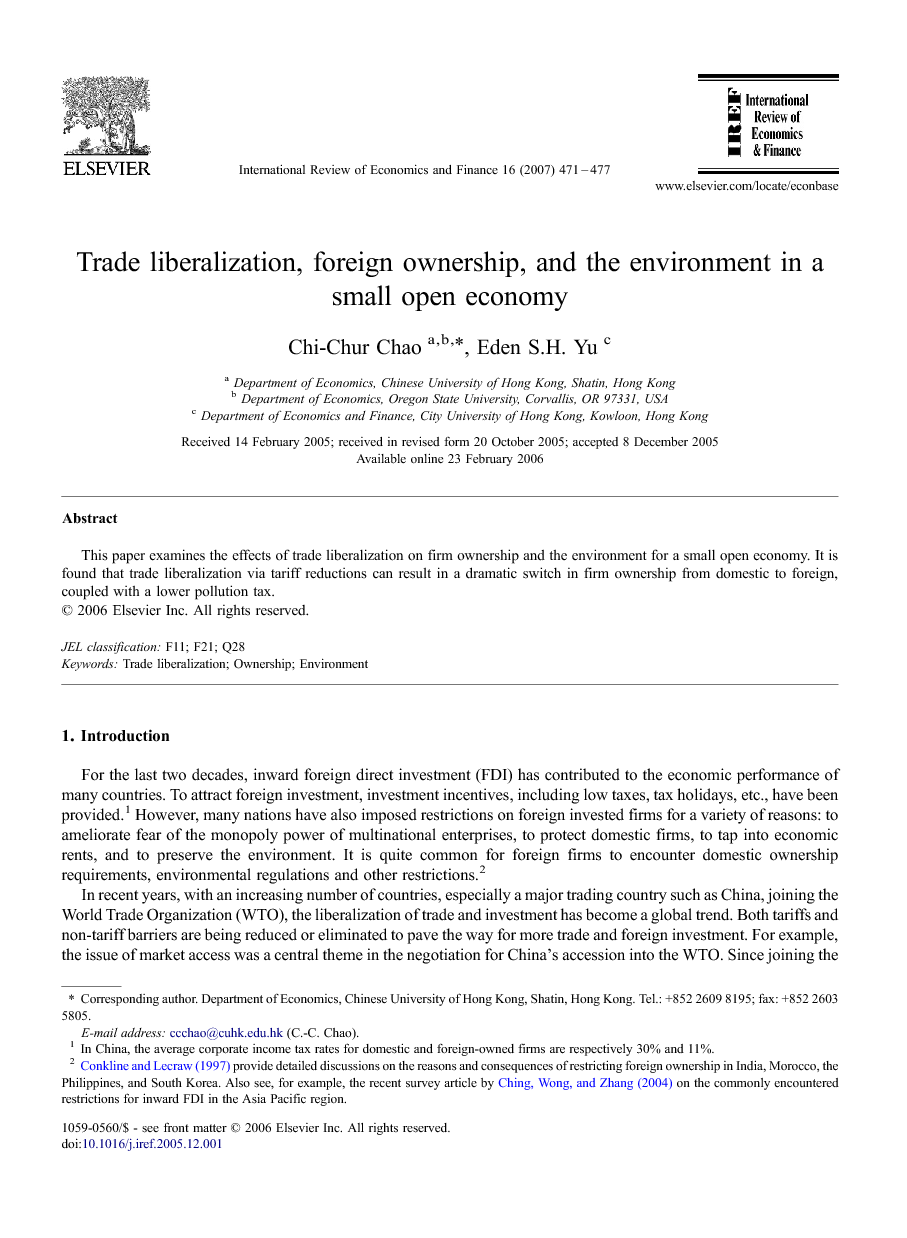This paper examines the effects of trade liberalization on firm ownership and the environment for a small open economy. It is found that trade liberalization via tariff reductions can result in a dramatic switch in firm ownership from domestic to foreign, coupled with a lower pollution tax.
For the last two decades, inward foreign direct investment (FDI) has contributed to the economic performance of many countries. To attract foreign investment, investment incentives, including low taxes, tax holidays, etc., have been provided.1 However, many nations have also imposed restrictions on foreign invested firms for a variety of reasons: to ameliorate fear of the monopoly power of multinational enterprises, to protect domestic firms, to tap into economic rents, and to preserve the environment. It is quite common for foreign firms to encounter domestic ownership requirements, environmental regulations and other restrictions.2
In recent years, with an increasing number of countries, especially a major trading country such as China, joining the World Trade Organization (WTO), the liberalization of trade and investment has become a global trend. Both tariffs and non-tariff barriers are being reduced or eliminated to pave the way for more trade and foreign investment. For example, the issue of market access was a central theme in the negotiation for China's accession into the WTO. Since joining the WTO on December 11, 2001, China is allowing increasingly more foreign ownership in various sectors over the next few years.3 The rise in the ratio of foreign ownership, through its effect on the inflows of FDI, would affect the economic performance and growth of the host country.
On the other hand, liberalization of investment can lead to an increase in pollution especially for developing countries, which generally have less stringent environmental standards. Lax regulations and low pollution taxes in these countries provide an incentive for polluting industries in industrialized countries to move there. This is often referred to as “pollution exporting” or “ecological dumping”.4
Given that inward FDI plays a key role in promoting production and income and that the subsequent booming activities can lead to more pollution and environmental degradation, a policy issue which has been heatedly debated arises as to how a society can properly balance economic growth versus quality environment. The intricate link between foreign ownership and the environment and the resulting effect on national welfare has hitherto not been scrutinized.5 The purpose of this paper is to examine why and how trade liberalization affects firm ownership and the environment. Using a general equilibrium framework for a small open economy, we derive the optimal policies regarding domestic versus foreign ownership and the extent of environmental measures. Our main finding is that the optimal policies can be reversed with increasing trade liberalization. In particular, when the tariff exceeds a certain rate, the optimal policy consists of a 100% domestic ownership requirement and a stringent pollution tax. However, when the tariff falls below that critical rate, the optimal policy involves 100% foreign ownership coupled with a lax pollution levy. These results appear to be borne out by casual observations that liberalizing trade via tariff reduction has caused increasing foreign ownership with deteriorations in the environment.
This paper is organized as follows. Section 2 presents a simple general equilibrium model with ownership restrictions and environmental pollution. Section 3 examines the welfare impact of altering ownership restrictions and pollution taxes for the economy. In addition, the individually and jointly optimal policies regarding ownership and pollution are derived, and the consequent implications of trade liberalization on them are deduced. Section 4 provides some concluding remarks.
This paper has examined for a small open economy the important effects of trade liberalization on firms' ownership and the environment. The linkages between foreign investment and the environmental policies have been explored. We derived the optimal policies separately for regulating pollution and foreign ownership as well as jointly for both issues. Our main result is that as tariffs fall below a critical level, the optimal ratio of foreign ownership can switch from zero to 100%, coupled with a loosening of environmental standard.
Our analysis is consistent with the casual observations that trade liberalization, especially in developing nations, can lead to lax pollution regulations in the midst of rising foreign investment. Our results appear to be supportive of the prediction by the “pollution exporting” hypothesis that trade liberalization can result in environmental degradations in the South.12 It should nonetheless be pointed out that the estimates in several empirical studies, by Grossman and Krueger (1993), among others, indicate that the increase in pollution subsequent to trade liberalization is, however, relatively small. This may be partially explained by the use of pollution abating technology by foreign invested firms. The role of abatement in the optimal policies can be a topic of our future research.


